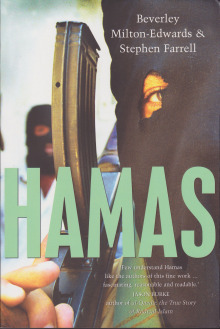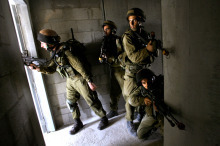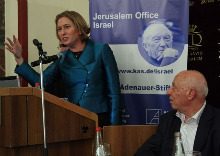Matt Rees's Blog - Posts Tagged "hezbollah"
Scribe and Scholar enter world of Hamas
 A New York Times correspondent teams up with a Belfast professor to write the story of Islamism among the Palestinians.
A New York Times correspondent teams up with a Belfast professor to write the story of Islamism among the Palestinians.JERUSALEM — Stephen Farrell was sipping coffee in the office of his money changer on Salah ud-Din Street, East Jerusalem’s main commercial strip, four years ago, when Beverley Milton-Edwards entered. From his rucksack, Farrell produced a copy of a book about Islamic militants written by the Queens University Belfast professor.
“Your book saved my life when I was kidnapped in Iraq,” he said, referring to a brief period of captivity by militants in Baghdad in 2004 when working for The Times of London. The dogeared volume had given London-born Farrell, now a New York Times foreign correspondent, the background he needed to convince his kidnappers that he had studied and understood their political and religious concerns. (Money may also have changed hands, of course...)
“That’s quite an endorsement,” Milton-Edwards responded. “Would you write that for the cover of my next book.”
Instead, he wrote an entire book with her. “Hamas: The Islamic Resistance Movement” (Polity Press) is the product of a decade in the Middle East for Farrell — who was kidnapped again, by the Taliban in Afghanistan, last September and freed by British commandos.
Surprisingly, given the amount of ink spilled over Hamas, it’s the first book broadly profiling the Islamic group that’s not written by an Arab or Israeli author. (GlobalPost correspondent Thanassis Cambanis may do the same for another militant group oddly neglected by Western book authors with his "A Privilege to Die: Inside Hezbollah's Legions and Their Endless War Against Israel," to be published September by Free Press.)
It’s certainly an opportune time for a history and analysis of Hamas. The group, which originated in Gaza during the first Palestinian intifada, transformed in recent years, initially killing more Israelis during the second intifada than previously would’ve been imaginable, then reversing its refusal to run in elections. Hamas won the parliamentary elections of 2006 and, in 2007, ran its rival Fatah out of the Gaza Strip, setting up the present quagmire of Palestinian politics.
I’ve known Farrell since he arrived in the Middle East for the London Times, having previously done a spell in Kosovo. He soon acquired a reputation for extreme thoroughness. On one visit to the southern Gaza Strip town of Rafah during the intifada, I ran into Farrell. He wasn’t there to cover a particular story. He said he hadn’t been busy, so he’d gone out to see what he might find. Given the volume of stories required of Jerusalem-based correspondents and the risks involved in getting to Rafah, extra-credit work such as this was rather unheard of.
“It’s very difficult to know something second-hand,” said Farrell, over coffee in a theater cafe in Jerusalem. “When you’re at the scene, things are so much more complex. That’s why you need to examine it in a book.”
Milton-Edwards provided much of the historical background that informs the book’s fascinating sections on the history of Islamism among the Palestinians before the foundation of Israel, and the activism in the 1970s of the men who would later form Hamas. But she, too, participated in much of the research on the ground, having a long-term knowledge of the place. She completed a Ph.D. on Hamas and Islamic Jihad after a media internship in Jerusalem during the first intifada.
That extensive research provides some of the most interesting snippets in the book. Hamas founder Ahmed Yassin was, in fact, an educator, not a religious leader, though he has been almost universally known as “Sheikh Yassin,” an honorific implying great Islamic learning.
The book’s historical perspective also provides surprising statistics. During the five years before the 2006 elections, Hamas had killed 400 Israelis. That’s an enormous toll, but amounts to just a couple of days work for Islamic radicals in Iraq about whom we know much less.
Written in a tone that tends closer to a plain academic style than the more trendy novelistic type of nonfiction book, “Hamas” doesn’t restrict itself to the politics and the violence. There’s a lengthy segment on the group’s approach to women — largely negative, particularly when seen through the eyes of the cosmopolitan leaders of the previous generation, like the chain-smoking Mariam Abu Dugga who wears no headscarf and used to be a member of the “Martyr Guevara” group.
Within Palestinian society, Farrell and Milton-Edwards examine Hamas’ treatment of those it considers collaborators with Israel or merely uncommitted to the Islamic lifestyle. Needless to say, it doesn’t look good.
“We don’t whitewash Hamas,” said Milton-Edwards. “We don’t ignore their cruelties.”
The more recent internal divisions within Hamas are laid out plainly and in a detail not found elsewhere. The book looks at the still burgeoning conflict between the group’s original leadership — no blushing softies, after all — and a new generation of military leaders in Gaza in particular which wants Hamas to adopt a “salafi” line akin to the even more uncompromising Islamists produced by the Gulf states. The less-than-encouraging news is that in the last year the “salafist” wing of Hamas has taken the upper hand over the relative moderates.
Behind all this Farrell and Milton-Edwards identify a failure of leadership on the part of Hamas and its Fatah rivals that’s summed up by Hanan Ashrawi, a former Palestinian peace negotiator quoted in the book: “Hamas had to learn very quickly how to be in power and Fatah has to learn how to be out of power. Both of them haven’t learned, really. Fatah is not used to being in opposition, it doesn’t know how to, and Hamas is not used to being in government, and it behaved like an opposition.”
(I posted this on Global Post. Read more of my dispatches.)
Published on April 25, 2010 02:00
•
Tags:
afghanistan, baghdad, belfast, beverley-milton-edwards, books, fatah, gaza, hamas, hanan-ashrawi, hezbollah, intifada, iraq, islam, jerusalem, middle-east, new-york-times, palestine, palestinians, polity-press, queens-university-belfast, reviews, sheikh-yassin, stephen-farrell, taliban, terrorism, thanassis-cambanis
Israel prepares for next threat--nuclear?
 NABLUS, West Bank — During the Palestinian intifada, I sat on a dusty hilltop overlooking this most violent of West Bank towns with a dozen of the top Israeli officers in the area. The brigade commanders told their regional chiefs that all the police work and house-to-house fighting of the intifada had made their troops ill-prepared for a real war. “If we had to fight in Lebanon, my men wouldn’t know what they were doing,” shouted one.
NABLUS, West Bank — During the Palestinian intifada, I sat on a dusty hilltop overlooking this most violent of West Bank towns with a dozen of the top Israeli officers in the area. The brigade commanders told their regional chiefs that all the police work and house-to-house fighting of the intifada had made their troops ill-prepared for a real war. “If we had to fight in Lebanon, my men wouldn’t know what they were doing,” shouted one.In 2006, that prediction was proven largely true, as Israeli forces were matched on the ground by Hezbollah’s militia. The air- and missile-warfare that went on over their heads was devastating to Lebanese and Israeli civilians, but Israel’s military planners were shocked by the difficulties faced by their ground troops.
For Israel, the threat these days is clear. Nablus is quiet, its gunmen subdued by Palestinian police who are trained with American help and the economy bolstered by American aid. This week, Israeli soldiers will run through a series of exercises to practice for a potential conflict with Hezbollah on the country’s northern border.
The main unknown in those exercises: How long does Israel have before the threat of nuclear attack will come into play?
Israeli government officials and security chiefs are reluctant to talk about how Israel might respond if Iran succeeds in obtaining nuclear weapons. They prefer to emphasize the destabilization of the international balance of power should such a situation arise. “We should focus on prevention,” Intelligence Minister Dan Meridor told international journalists last week. “Prophylactics, rather than dealing with unwanted results.”
So the disdain in Jerusalem was absolute for the Turkish-Brazilian deal announced last week under which Iran would ship some of its uranium to Turkey. To use Meridor’s biological analogy, that was about as much use as a prophylactic with a big hole in it. The Iranians were playing for time, Israeli officials said, and the United States was right to override the deal and go for strong sanctions.
Trouble is, most Israeli officials don’t expect those sanctions to work any more. Israel is starting to come to terms with a burgeoning Middle Eastern nuclear arms race. It will start the race with a lead — it has had nuclear weapons for four decades. But with Iran coming up on the rails and Saudi Arabia and Egypt, unwilling to be potentially threatened by Tehran, soon joining the competition, the dangers to the Jewish state are considerable.
It’s de rigueur for international strategists to say that Israel isn’t the country that should be most worried by Iranian nuclear ambitions. Instead, they posit the Gulf states, Shia Iran’s Sunni Muslim rivals, as the most at-risk.
There’s something to that. Yet Iran’s biggest success in exporting Islamic Revolution has been through Hezbollah in Lebanon. It also now has a direct line to Gaza with Hamas, which it helps to bankroll. Both would be easy places from which to use nuclear capability to influence regional — or even world — events.
Israel’s response to the Iranian move toward nukes is complicated. Its actions are limited. A potential aerial attack on Iran’s nuclear facilities would be difficult without bunker-buster bombs or coordination with the U.S. and the Arab countries over which Israeli jets would have to fly.
Diplomatically, Israel has little faith that sanctions can do anything more than delay an Iranian bomb. Why? Because it has experience of its own in negotiating about an issue so long that its negotiating partner in the end accepts a sliver of what it had originally asked for — and even then the negotiations can start again without reference to previous deals.
That’s a familiar tactic in Jerusalem, which has frequently confounded Western negotiators. Just as Iran has infuriated Washington with the sanctions issue, agreeing to something when total breakdown seemed imminent and pulling back just before it was required to act.
In public, at least, Israeli officials are forced to push for stiff sanctions, as if they thought that'd make a difference. But rather than believing Iran’s nuclear program will be ended, they view the sanctions as a way of buying time for Israel to prepare its troops exercises like those this week and to ready more advanced missile defenses.
Congress this week voted for President Barack Obama’s plan to give $205 million to Israel to fund its short-range missile defense system. That’s vital to Israel now, given Hamas’ rockets in Gaza, which have Tel Aviv in range, and Hezbollah’s ability to hit any place in Israel with some of its 42,000 missile arsenal. But it will only be more important once the equation has a nuclear component.
(I posted this on Global Post.)
Published on May 23, 2010 01:46
•
Tags:
brazil, crime-fiction, dan-meridor, gaza, global-post, hamas, hezbollah, iran, israel, israeli-army, israelis, jerusalem, journalism, lebanon, middle-east, nablus, nuclear-weapons, palestine, palestinians, tehran, turkey, west-bank
Tragic friends on a search for peace
 JERUSALEM—If you asked about a moment that encapsulates the tragedy of the Israelis and Palestinians, there’d be no shortage of incidents, fatal and wrathful, from which to choose. This week, however, I’d point out an occasion that was less shocking but just as poignant.
JERUSALEM—If you asked about a moment that encapsulates the tragedy of the Israelis and Palestinians, there’d be no shortage of incidents, fatal and wrathful, from which to choose. This week, however, I’d point out an occasion that was less shocking but just as poignant.In a banquet hall of the King David Hotel, an Israeli leader and a Palestinian leader came to the podium together Sunday evening. They embraced, spoke of each other as good friends and talked of the breakthroughs they made in the peace talks they shared. The audience applauded warmly and a benign smile made its way to the faces of almost everyone in the room.
Why is this a tragedy? Because former Israeli Foreign Minister Tzipi Livni and Ahmed Qurei, a member of the Palestine Liberation Organization’s Executive Committee, failed to make a peace deal.
The two were prime negotiators at regular meetings in the King David Hotel during 2007 and 2008 in what became known as the Annapolis Process — for a conference held in late 2007 at the U.S. Naval Academy in Annapolis, Maryland. The talks got even closer to a resolution of the conflict than the Camp David summit of 2000. In the end, Livni’s boss, Prime Minister Ehud Olmert, said that he made a wide-ranging offer to Palestinian President Mahmoud Abbas in 2008, never heard back and subsequently had to resign because of corruption investigations.
Since then talks have been at an impasse.
As Livni and Qurei reminisced affably about their near miss, I had two impressions. The first was that they had done a pretty good job of hiding how they really felt back when the negotiations were going on. Things in the region looked quite bad then. Israel fought a war with Hezbollah in Lebanon in 2006 and launched an attack on Hamas in Gaza at the end of 2008. Palestinians complained about building in Israeli settlements and, of course, fought a low-grade civil war between Hamas and Fatah.
The second important impression was that these two had really made a kind of personal peace. To differing degrees, they had gotten past the victimhood mentality that prevents either side from progressing. Yet they still hadn’t been able to hash out a deal, face to face across a table in a hotel (a very nice hotel, incidentally, where a basic room is $400 a night.)
In that case, what chance do peace talks now have?
Read the rest of this post on my blog The Man of Twists and Turns.
Published on July 17, 2010 09:56
•
Tags:
ahmed-qurei, annapolis-process, avigdor-lieberman, benjamin-netanyahu, ehud-olmert, fatah, gaza, hamas, hezbollah, intifada, israel, israelis, khalil-shikaki, king-david-hotel, lebanon, mahmoud-abbas, maryland, middle-east, palestine, palestinian, sarb-erekat, tzipi-livni, u-s-naval-academy
Hezbollah's rapture, resistance, and revolution
 Here's my review of A Privilege to Die: Inside Hezbollah’s Legions and Their Endless War Against Israel — by Thanassis Cambanis (Free Press). The review appeared this weekend on Global Post, where I'll be doing reviews of international fiction and nonfiction each month.
Here's my review of A Privilege to Die: Inside Hezbollah’s Legions and Their Endless War Against Israel — by Thanassis Cambanis (Free Press). The review appeared this weekend on Global Post, where I'll be doing reviews of international fiction and nonfiction each month.Most books on Hezbollah tend to focus, in one way or another, on the Lebanese Shia group’s fundamentalist politics. That’s in contrast to what strikes you as a journalist when you travel to southern Lebanon, one of the Hezbollah heartlands. There the greatest impressions are visceral. The earthquake of an Israeli artillery shell, which appears to have landed on top of you until you discover that it struck two kilometers away. The stark and lonely valleys, so distant from the typical snapshot of fist-pumping Shia masses. Most of all, it is the quiet readiness of the Hezbollah fighters for death.
In his groundbreaking book, Thanassis Cambanis has all the politics — he’s excellent in explaining how Hezbollah turned apparent defeat in its 2006 war with Israel into de facto control of Lebanon within three years. But he goes beyond the typical Hezbollah tome to give you the feel of war, writing of gunfire that came from “so close that it felt like someone ripping a sheaf of paper in my ear while tickling the inside of my gut with a feather” and the “incongruously whimsical” high-pitched raspberry that is the sound of a rocket in flight. He adds revealing insights into the lives of normally secretive Hezbollah fighters.
The essence of Hezbollah’s success, as Cambanis sees it, is its ability to carve out clear answers to the vital national questions. That’s a big advantage for Hezbollah over the cloudy mass of Lebanon’s vicious sectarian parties. (One Hezbollah voter tells Cambanis his choice was based on the fact that he was “sick of all these other assholes.”)
Hezbollah’s head since 1992, Hassan Nasrallah, enforces a strict fundamentalist discipline within the party. But other supporters are allowed to enjoy broader freedom. By eschewing the hard line of Hezbollah’s earlier days, Nasrallah has brought Hezbollah’s appeal to Muslims who don’t want to live as if Lebanon were Tehran, but who wish for the pride that comes with resistance to Israel. “In a landscape of nihilism,” Cambanis writes, “Hezbollah understood the intrinsic appeal of spiritual clarity.”
That clarity is based on a set of principles Cambanis describes as “rapture, resistance, revolution.” To illustrate the first of these, he takes his title from a comment by a Lebanese man who spoke to him while he was reporting on the 2006 war: “‘It would be a privilege to die for Sayyed Hassan [Nasrallah].’”
Read the rest of this review on Global Post, where I'll be doing reviews of international fiction and nonfiction each month.
Published on October 05, 2010 07:11
•
Tags:
hassan-nasrallah, hezbollah, journalism, lebanon, middle-east, nonfiction, reviews, shia, terrorism, thanassis-cambanis, the-boston-globe, the-new-york-times



